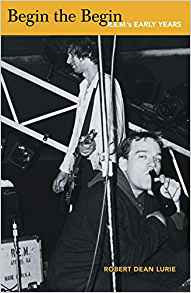Features
Begin the Begin: R.E.M.'s Early Years
by Benjamin Ray
R.E.M.’s career is neatly divided into three sections: the jangly IRS-label college-rock years of the ‘80s, the commercial success of 1988-1996, and the post-Bill Berry-to-2011 breakup section. For casual fans, R.E.M. exists in that commercial section, with only vague awareness of their career before “The One I Love.” For longtime fans – most of who grew up with the band, like myself and the author – the IRS years are not only the best years for the band but among the best underground rock that the ‘80s had to offer.
 It is this time period chronicled in Robert Dean Lurie’s new book, Begin The Begin, which is a quick and absorbing read for fans of this influential quartet. Unlike the other biographies on the market, Lurie’s book stops cold after the success of Document in 1987, when “The One I Love” started burning up the charts and the band signed to Warner Bros. Instead, it concentrates on the decade prior, focusing on the formation of the band, the early gigs, the real fans (“distiples”) and non-band members who were integral to the story, and the recording of those fabled five albums (plus the Chronic Town EP).
It is this time period chronicled in Robert Dean Lurie’s new book, Begin The Begin, which is a quick and absorbing read for fans of this influential quartet. Unlike the other biographies on the market, Lurie’s book stops cold after the success of Document in 1987, when “The One I Love” started burning up the charts and the band signed to Warner Bros. Instead, it concentrates on the decade prior, focusing on the formation of the band, the early gigs, the real fans (“distiples”) and non-band members who were integral to the story, and the recording of those fabled five albums (plus the Chronic Town EP).
In addition, because the second half of the book (from Murmur on) has already been documented, Lurie instead focuses on two key factors to set his book apart. The first is prime interviews with those who intimately knew the four guys when they were college students and struggling band members, people like Kathleen O’Brien (who introduced two of the guys and had a thing with Bill Berry), Velena Vego, William “Ort” Carlton, T. Patton Biddle, Jonny Hibbert (of Hib-Tone Records, which released the first “Radio Free Europe” single) and more. There are no interviews with the band members, which is not unusual for an R.E.M. bio, but this is as close as one can get.
The second focus is on the culture of Athens, Georgia, which basically becomes a minor character in and of itself. Lurie moved to Athens in the early ‘90s, missing out on the inception of the scene but absorbing what made the town a creative and cultural hotspot for so long. Frequently, especially in the first half, Lurie ties the events of the band to the time and place in which they lived, showing how the band was influenced by their surroundings. Where other similar books feint in this direction, Lurie really details it and how much of the Athens cultural scene they both influenced and were influenced by; you will walk away picturing Wuxtry Records, the church on Oconee Street, a rowdy night in the “subwastement” and a new appreciation for fellow bands Love Tractor, Pylon and the B-52’s as if you had been there.
It takes a good 75 pages to get to that fateful live show in the church and another 75 to get to the recording of Murmur, such is the level of research and detail. Longtime fans who may not know all of this will eat it up. For those a little less interested in that part, the second half of the book winds through the band’s five excellent IRS albums, hitting the high points of the recording sessions and gigs, the low points of Michael Stipe rubbing mustard in his hair before gigs and rarely showering, and the thrill of band cohering and improving before your eyes.
There is nothing salacious here, or at least nothing of any consequence, other than Lurie occasionally reminding the listener that these were college guys in their early 20s in a rock band and, consequently, the occasional sex ‘n’ drugs ‘n’ drink was to be had on tour. That tidbit somehow gets overlooked when thinking about the band as a whole, perhaps because they turned into a Serious Professional Band in the ‘90s. Lurie also documents how the band’s live show was far more energetic and covers-heavy (at least early on) than the albums seem to indicate, although he doesn’t really investigate why the band chose to record Murmur the way it did, which has always been a mystery to me.
His notes and thoughts on the albums are welcome for any fans, which Lurie clearly is, even if the reader might not agree with him. I, for one, have never felt about Lifes Rich Pageant or Murmur the way Lurie and other fans do, while I hold Document in a higher regard than he does. We both agree on the brilliance of Reckoning and Fables Of The Reconstruction, so there’s that. About the only criticism of this book is Lurie’s attempt to interpret Stipe’s lyrics, which were never really meant to be interpreted at the early stages. The supposition is at odds with the informal yet factual approach of the rest of the book, and it gets a bit distracting at times.
But that’s a minor quibble. For fans of the band’s early years or the birth of the college rock scene and alternative music in general, Begin The Begin is well worth picking up.